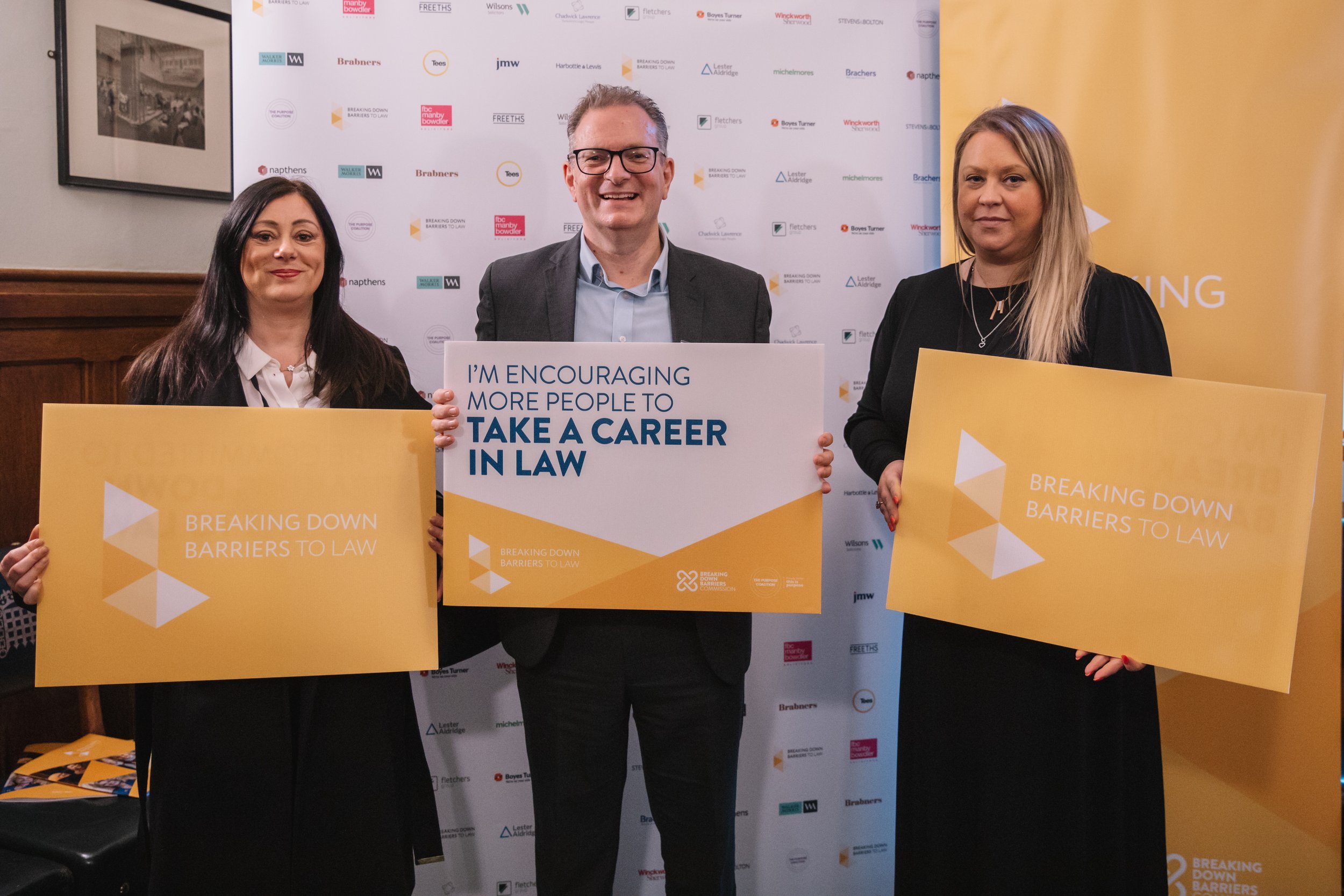Breaking down the barriers to law – a blueprint for collaborative action
A strategic, countrywide approach to embedding social mobility in the legal sector is the focus of a new report whose first phase launched in Parliament today.
The Breaking Down Barriers to Law: Phase 1 report is the result of a collaborative project by the Purpose Coalition and a group of leading law firms and marks the first phase of an action plan to boost social mobility in the sector. It focuses on the four key areas of outreach, access, recruitment and progression where those from disadvantaged and underrepresented backgrounds face the greatest barriers. A number of Purpose Coalition university partners also took part in the project to contribute a vital higher education perspective.
A series of roundtable workshops considered each of the four focus areas and participating firms looked in depth at the challenges they face in each area and at the variety of measures they have introduced to tackle them. It showcases best practice examples from across the country which include :
Outreach activities to primary and secondary schools, as well as to those who may have been out of the workplace for some time;
Work experience and open days provide valuable insights into legal practice, providing information and knowledge about the range of opportunities that law firms can offer, including apprenticeships and non-traditional career paths;
The adoption of name blind recruitment and contextual recruitment practices to encourage a more level playing field in recruitment practices;
Career development programmes, inclusion schemes and mentorships to support those from disadvantaged and underrepresented backgrounds to stay in the sector and thrive.





The discussions helped develop a series of recommendations for short and long-term action. In the short-term, these range from the establishment of outreach links with a network of universities, schools and colleges in social mobility cold spots to collecting, tracking and reporting socio-economic data at every level of seniority to ensure progression is fair. In the longer term, recommendations include the development of a collective multi-channel social media campaign focusing on demystifying the legal sector and additional SQE support courses and resources for apprentices, trainees and paralegals.
Rt Hon Justine Greening said:
“I am incredibly proud of the work that this Breaking Down Barriers to Law Taskforce has undertaken. By pooling their resources, sharing insights and demonstrating sector-leading best practice, the participating firms have demonstrated real commitment to delivering social impact in the areas they serve.
The frank discussions on the challenges facing the legal sector as they seek to address the issue of poor social mobility were wide-ranging and constructive and have helped inform the recommendations for future action in the report which are demanding but achievable. The project has shown how collaboration and partnership can make a significant impact on the development of positive solutions.
“The legal sector has long been seen as a closed shop for many who might aspire to work in it. There has been undoubted progress – and the best practice featured in the report shows the difference that tailored action can make - but there is still much more to do.
It’s clear that there is an appetite for change, and it is increasingly the case that those who demonstrate the most effective social impact in the legal sector and in the wider business world will attract the largest talent pool. I am looking forward to continuing to work with the Taskforce as they implement the recommendations and as we move on to the next phases of our work.”
Chair of the Breaking Down Barriers Commission and former member of Sir Keir Starmer’s Shadow Cabinet, Nick Forbes CBE said:
“The Breaking Down Barriers to Law project, and this Action Plan, demonstrate the positive impact that working in partnership can bring. In a sector that is critical to the economy, this collaboration has seen a laser-like focus on the elements that are essential to creating career pathways beyond the traditional networks of the right family, school or university, if it is to open up opportunities to those from disadvantaged and underrepresented backgrounds.
I hope that it will inspire others in the legal sector, and in professional services more widely, who may be at different stages in their social mobility journey, to consider how they might also take the steps that will deliver equality of opportunity in their businesses.”
Further phases of the project will scale up impact and progress, with a focus on the supply chain and community impact. These are expected to be particularly relevant ahead of a potential Labour government which has breaking down barriers to opportunity as one of its five missions.
Notes to Editors
Participating law firms include Fletchers Group, FBC Manby Bowdler, Lester Aldridge LLP, Winckworth Sherwood, Walker Morris, JMW Solicitors, Boyes Turner, Brachers, Stevens & Bolton, Harbottle & Lewis, Wilsons Solicitors LLP, Tees Law, Chadwick Lawrence, Freeths, Brabners LLP, Napthens, and Michelmores.
Participating university partners include the University of Chester, the University of Greenwich, the University of Northumbria, the University of Stirling, Staffordshire University, Newcastle University and Liverpool Hope University.


































































